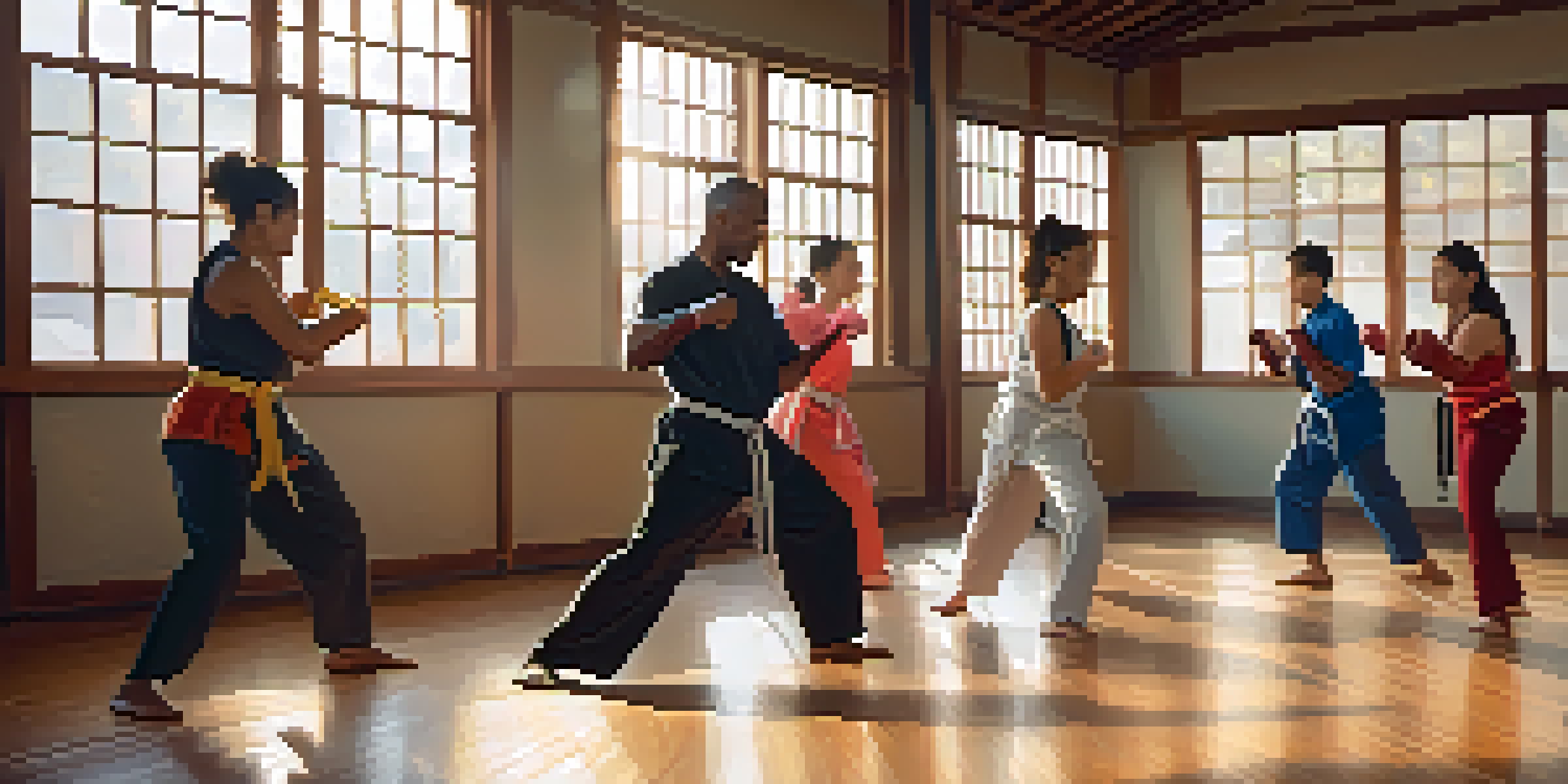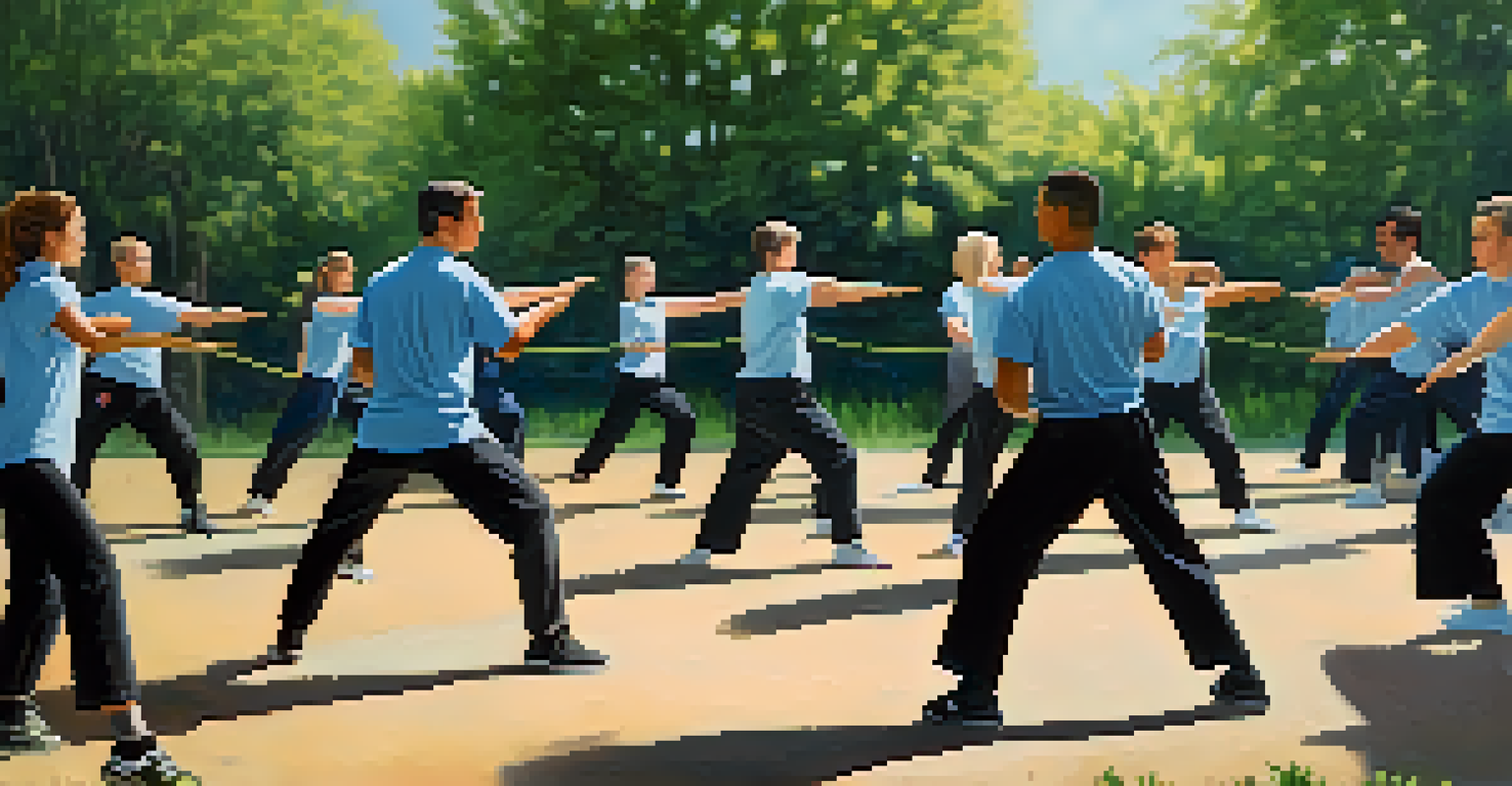The Connection Between Self Defense and Self-Esteem

Understanding Self-Defense: More Than Just Fighting
Self-defense encompasses a range of techniques aimed at protecting oneself from harm. But it's not solely about physical combat; it also includes mental strategies to avoid dangerous situations. By learning self-defense, individuals gain valuable skills that can enhance their sense of security in everyday life. This foundation sets the stage for deeper personal growth, particularly in building self-esteem.
The greatest weapon against stress is our ability to choose one thought over another.
Many people think of self-defense as a last resort, but it's more about empowerment. When you understand how to protect yourself, you can navigate the world with increased confidence. Imagine walking into a room filled with strangers; knowing you have the tools to handle potential threats can transform your experience from anxiety-ridden to empowering.
Self-defense training often involves physical conditioning, which also contributes to feeling better about oneself. As individuals learn new moves and techniques, they often see improvements in their physical fitness. This combination of skill and fitness can lead to a profound sense of accomplishment, further boosting self-esteem.
The Psychological Benefits of Self-Defense Training
Engaging in self-defense training can significantly affect mental health. Participants often report reduced stress levels and increased resilience when faced with challenges. The focus required during training sessions helps individuals to stay present, reducing anxiety about past or future events.

Moreover, self-defense teaches individuals to trust their instincts, which is crucial for self-esteem. When you learn to listen to your gut feelings, you're more likely to make decisions that align with your values and needs. This trust in oneself fosters a positive self-image and reinforces the belief that you can handle whatever life throws your way.
Self-Defense Empowers Personal Growth
Learning self-defense enhances self-esteem and confidence, transforming how individuals navigate their lives.
Social interaction is another psychological advantage of self-defense classes. Meeting people with similar interests creates a sense of community and belonging. These connections can further enhance self-esteem, as individuals feel supported in their journey toward confidence and safety.
Building Confidence Through Skill Development
As individuals progress in self-defense classes, they acquire new skills that contribute to their confidence. Each new technique mastered represents a small victory, reinforcing the idea that one can achieve goals through dedication and practice. This process mirrors life itself: the more you put into something, the more you gain from it.
Self-defense is not just a set of techniques, it’s a state of mind that begins with the belief that you are worth defending.
Learning self-defense also helps individuals overcome fears. For instance, someone who once felt intimidated by the thought of confrontation may find themselves tackling scenarios with newfound courage. This transformation from fear to confidence is invaluable, proving that self-defense training is as much about mental strength as it is about physical ability.
Additionally, the act of practicing self-defense fosters a growth mindset. Participants learn to embrace challenges and view failures as opportunities for growth. This shift in perspective can have a ripple effect, improving self-esteem beyond the dojo and into other areas of life.
The Role of Community in Enhancing Self-Esteem
Community plays a pivotal role in the self-defense journey. When individuals train together, they often share experiences and support one another, creating a safe environment for growth. This sense of camaraderie can significantly boost self-esteem, as participants feel valued and understood.
In many self-defense classes, instructors encourage a team-oriented approach. This collaborative atmosphere fosters friendships and mutual respect, reinforcing the idea that everyone is on a journey to improve themselves. As individuals cheer each other on, they cultivate a collective sense of achievement that elevates everyone’s self-esteem.
Community Boosts Confidence
Training in groups fosters a sense of belonging and accountability, which significantly uplifts participants' self-esteem.
Moreover, being part of a community often leads to accountability. When surrounded by others who share similar goals, individuals are less likely to give up on their training. This sense of responsibility to oneself and others can further enhance confidence, as it creates a supportive network committed to personal growth.
Overcoming Self-Doubt Through Self-Defense
Self-doubt can be a significant barrier to self-esteem. However, self-defense training provides a structured way to confront and overcome these feelings. As individuals learn to defend themselves, they begin to challenge the negative thoughts that may have held them back for years.
The training environment often encourages participants to push past their comfort zones. This gradual exposure to challenges can help dismantle the critical inner voice that fosters self-doubt. With each successful practice, individuals learn that they are capable of more than they initially believed.
As participants gain mastery over self-defense techniques, they often find that this newfound confidence extends beyond the training space. They may start to approach life challenges with the same determination and resilience, leading to improved self-esteem in various aspects of their lives.
Self-Defense as a Form of Self-Care
Self-defense can also be seen as a form of self-care. Taking the time to invest in one’s safety and well-being is a powerful act of self-love. Individuals who engage in self-defense training often report feeling more empowered in their daily lives, which contributes to overall mental health.
Practicing self-defense requires individuals to prioritize their physical and emotional needs. This focus on self-care can create a positive feedback loop, where enhanced self-esteem leads to better self-care practices and vice versa. It’s a reminder that taking care of oneself is not selfish but rather essential for personal growth.
Self-Defense as Self-Care
Engaging in self-defense training is a powerful form of self-care that reinforces personal strength and mental health.
Furthermore, incorporating self-defense into one’s routine can serve as a reminder of personal strength. Each training session reinforces the idea that individuals are worthy of protection and respect, both from themselves and others. This realization can be transformative, fostering a healthier self-image.
Real-Life Examples of Self-Defense and Self-Esteem
Many people have shared their stories of transformation through self-defense training. For instance, consider a young woman who struggled with anxiety and self-doubt. After enrolling in a self-defense class, she not only learned how to protect herself but also gained the confidence to speak up in social situations, dramatically improving her self-esteem.
Another example includes a middle-aged man who faced intimidation in his workplace. After taking part in self-defense training, he not only learned physical techniques but also developed the assertiveness needed to stand his ground. His newfound confidence helped him not only at work but also in his personal relationships.

These stories highlight the profound impact self-defense can have on self-esteem. Through training, individuals can reclaim their narratives, turning feelings of vulnerability into strength and empowerment. Each journey is unique, but the common thread remains: self-defense training fosters a healthier sense of self-worth.